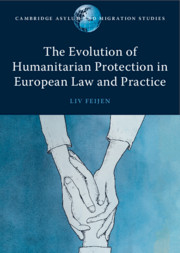Book contents
- The Evolution of Humanitarian Protection in European Law and Practice
- Cambridge Asylum and Migration Studies
- The Evolution of Humanitarian Protection in European Law and Practice
- Copyright page
- Dedication
- Contents
- Preface
- Table of Cases
- Abbreviations
- Introduction
- 1 The Ethical Dimension of Immigration Policies
- 2 Humanitarian Considerations and the Institution of Asylum
- 3 Humanitarian Protection or Human Rights Protection?
- 4 A Solution for Persons with Other Protection Needs
- 5 From an Act of Charity towards a Legal Obligation?
- Conclusion
- Select Bibliography
- Index
2 - Humanitarian Considerations and the Institution of Asylum
Published online by Cambridge University Press: 16 March 2021
- The Evolution of Humanitarian Protection in European Law and Practice
- Cambridge Asylum and Migration Studies
- The Evolution of Humanitarian Protection in European Law and Practice
- Copyright page
- Dedication
- Contents
- Preface
- Table of Cases
- Abbreviations
- Introduction
- 1 The Ethical Dimension of Immigration Policies
- 2 Humanitarian Considerations and the Institution of Asylum
- 3 Humanitarian Protection or Human Rights Protection?
- 4 A Solution for Persons with Other Protection Needs
- 5 From an Act of Charity towards a Legal Obligation?
- Conclusion
- Select Bibliography
- Index
Summary
This chapter explores how humanitarian values influenced the broadening of the personal scope of asylum and compassionate grounds relate to protection grounds, such as refugee status and subsidiary protection. In the last couple of decades, a number of states have introduced the possibility of granting residence permits to non-nationals with a reference to humanitarian or compassionate reasons. These categories are generally not considered to have received ‘asylum’, but receive leave to remain or temporary residence permits. It is frequently claimed that humanitarian status is significantly different than refugee status and even so-called subsidiary protection and that its legal and conceptual basis is different. The phenomenon of admitting, or refraining from returning, persons crossing an international border because it would be contrary to humanitarian values is, however, not new and what are currently considered as compassionate, or humanitarian, grounds for admission or non-expulsion have throughout times been considered grounds for asylum or protection.
- Type
- Chapter
- Information
- Publisher: Cambridge University PressPrint publication year: 2021

